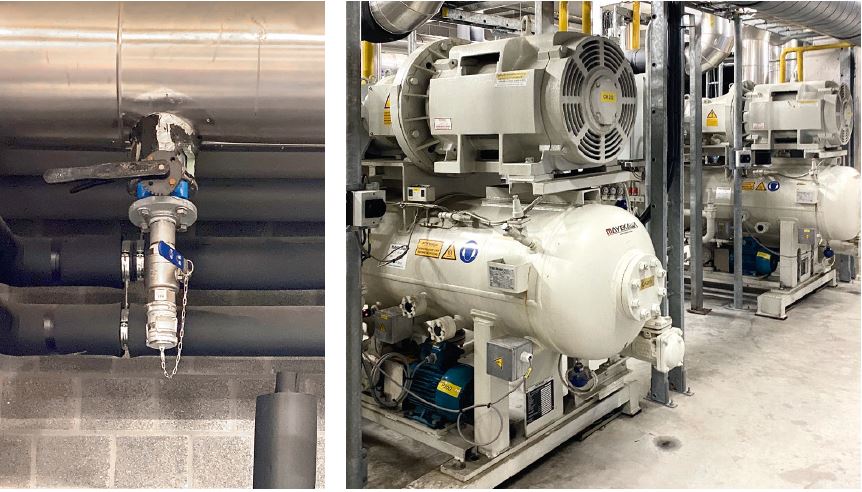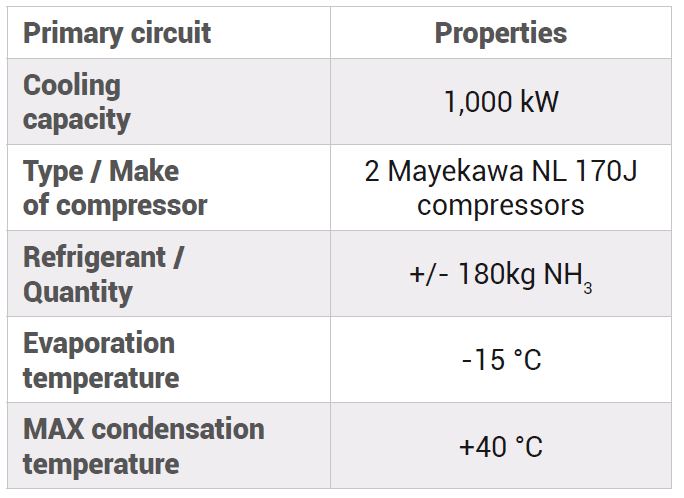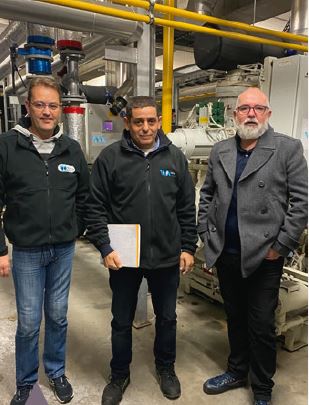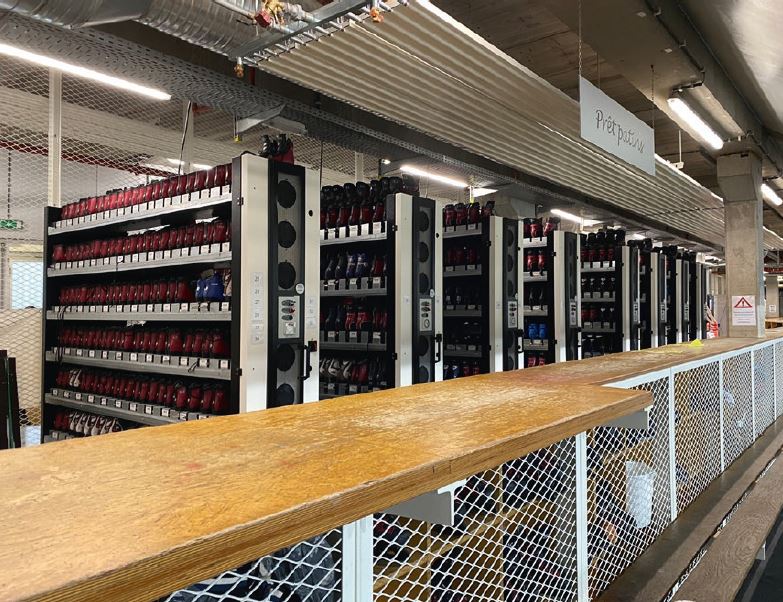Liège’s Olympic ice rink is part of the Médiacité complex. It is a sports arena with a surface area of 1,800 m² built in 2012 by the city. It has a changing room with 1,100 pairs of quality skates stored in heated lockers. The stands have heated seats for up to 1,250 spectators.
Throughout the year, the ice rink organises national and international ice hockey competitions, events, themed evenings and sound and light shows. But it’s also a great place for ice-skating enthusiasts, where young and old, with family or friends, come together to skate in a friendly atmosphere.
| Activity | Temperature |
| General public leisure | -7°C |
| Figure skating | -7°C |
| Ice Hockey | -9,5°C |
| Curling | -7°C |
To ensure quality ice for each of these activities, rigorous temperature management is essential.
When the ice rink was built, an indirect system was put in place to cool the slab and the ice. The installation’s primary circuit was charged with 180 kg of ammonia and the secondary network contained 13 tonnes of alkali, an ammonia-based aqueous solution.
The ice rink consists of three layers: the pipes, a layer of concrete and the ice. The technical installation is located in the basement of the building.
In the context of sustainable development, VMA, the company in charge of maintenance, is proposing to change the heat transfer fluid to a bio-sourced alternative to meet the expectations of the city of Liège.
VMA Refrigeration, a subsidiary of civil engineering contractor CFE, has been present on the Belgian market for 120 years. VMA has more than 30 years’ solid experience in industrial refrigeration and supports its customers from project design through to maintenance, optimising energy efficiency. It works on multidisciplinary projects (electrical engineering, HVAC, refrigeration, energy flow management, energy savings, etc.) and employs 1,000 people.
The aim was to find a suitable secondary fluid: ‘The town did not want to change the architecture of the existing refrigeration plant, but simply to replace the alkali with another heat transfer fluid that was compatible with the system in place and that was environmentally friendly,’ explains Abdel Lourhmati, industrial refrigeration expert at VMA.
Greenway® Neo N, the ecological and safe alternative
Thierry Pierre Put, Climalife’s sales representative, was consulted by VMA and proposed two plant-based solutions: Thermera and Greenway® Neo N. A comparison and analysis of the properties of each solution revealed that Greenway Neo N had a better density and was more suitable for this application. This heat transfer fluid, formulated and produced by Climalife, was also selected for its advantages in terms of carbon footprint reduction and safety.
Greenway® Neo N is a bio-sourced heat transfer fluid. It is bacteriostatic and contains high-performance hybrid inhibitors. The plant-based raw material 1,3-propanediol has a lower viscosity than MPG (Mono Propylene Glycol).
Another of its characteristics is its biodegradability. In the event of a leak, there is less risk of soil contamination.
A well-managed high-risk operation
To drain the alkali and charge the system with Greenway Neo N, three crucial stages are carried out in succession on Sundays, when the sports centre is closed.

Beforehand, a safety analysis was carried out in conjunction with the main contractor and the relevant departments for the pumping of the 13 tonnes of alkali. An additional valve was added to the system to facilitate the operation.
VMA called in a specialist company to provide a tanker truck to recover the alkali. Long pipes were laid to reach the plant located at the bottom of the car park. The truck was fitted with a large air filter, coupled to a ventilated water tank to relieve excess pressure and facilitate pumping. Two large tanks containing 1,000 litres of water are used to neutralise ammonia vapours during the transfer. Every precaution was taken to avoid any risk of off-gassing in Liège city centre. This type of work requires considerable expertise in ammonia fluids and perfect mastery of hydraulic circuits. Once the alkali has been recovered, it is destroyed in a special centre and the truck is cleaned with water.
The second stage involves rinsing the entire system and pipes.
Finally, 11,000 litres of Greenway® Neo N for frost protection at -25°C were charged into the network. ‘This last stage went very smoothly: it took a full day to fill the system, three days to set it up and around two weeks to reach the desired temperature,’ says Pascal Michot, Industrial After-Sales Project Engineer at VMA Réfrigération.
After a few months in action, the results are excellent.


Greenway® Neo N is compatible with the cooling system in place from the outset.
A slight increase in pumping energy has also been noted, but this is very marginal. The advantages of Greenway® Neo N remain paramount, namely safety and the ecological solution to which the city of Liège attaches great importance.
VMA Refrigeration will continue to maintain the facility on a regular basis to ensure that hockey players and skaters can take full advantage of the Olympic rink. At the same time, the company will also manage the heat recovery system installed to heat the car park, the premises and the snow pit.

From left to right, Pascal Michot, industrial after-sales project engineer, Abdel Lourhmati, industrial refrigeration expert and Thierry Pierre Put, Climalife sales representative in Belgium.

